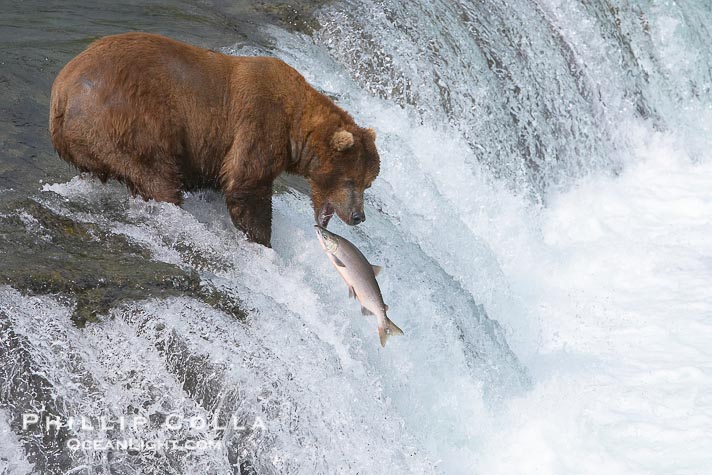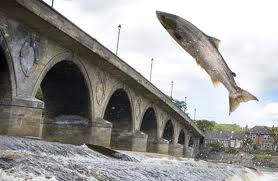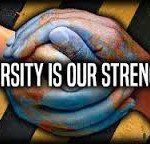Jeanne and I spent a couple of lovely days last week with friends in Port Hope, Ontario before they drove us to Toronto where Jeanne had a Saturday work event. Port Hope is on the north shore of Lake Ontario about sixty miles east of the big city. During our visit our friend Tom took us to what he called the “fish ladder” where we, along with dozens of fellow visitors, watched salmon striving to leap a small human-made waterfall as they head upstream to spawn and die.
On the left of the falls, not in the video, is a channel (the “fish ladder”) where with some effort a salmon can swim upstream in steps rather than taking on the impossible task of taking the falls in one leap. But the vast majority of the salmon batter themselves against the falls and the concrete structures before they find the channel. Some never do find it.
Jeanne had a hard time watching the spectacle–“It’s so sad!” Who the hell set this situation up to begin with? My thoughts went in an entirely different direction as I remembered something from The Unicorn, one of Iris Murdoch’s early novels. One of the characters asks “Have you ever seen salmon leaping? Such fantastic bravery, to enter another element like that. Like souls approaching God.” There’s a lot in that comparison. What we saw last Friday was beautiful, courageous, and sad in its apparent futility. Is that what it is like to seek God?
Salmon are hard-wired to do what they do, a hard-wiring that drives them to a place in which they are not equipped to survive and, ultimately, to death. This is hardly an attractive picture of the human search for God, but there’s a certain familiarity to it. In the Old Testament God is frequently hiding, in a thick cloud, in a burning bush, beyond a rock, because if a human actually experienced God directly that would be the end of the human. God’s element is not ours, yet just as the salmon there is something unavoidable in us that draws us toward that divine element and, perhaps, to our destruction. Great news.
Two salmon are discussing their options:
Bob: Are you ready to start heading upstream? It’s about that time.
Sam: I’m not doing it. You remember all those guys who headed upstream to do this last year? You ever seen them since?
Bob: No, but so what? This is what salmon do. This is what we were made for.
Sam: Not me. You go right ahead—been nice knowing you. I’m staying here.
B ob: What are you, a salmon or a flounder? Any salmon worthy of the name swims upstream and leaps the falls!
ob: What are you, a salmon or a flounder? Any salmon worthy of the name swims upstream and leaps the falls!
Sam: I feel the same urge you do! But not every itch needs to be scratched. I prefer to be a wimpy salmon and alive to being a salmonly salmon and dead.
Bob: You’re no salmon at all. You can’t be a salmon and not leap!
Sam: You know what, I think this whole leaping thing is just a bunch of crap our parents and grandparents put on us. I can still be a salmon and stay in this part of the river. You leaping salmon are a bunch of schooling fish who believe you have to do something just because you were told you do.
I’m reminded of Dietrich Bonhoeffer, who once wrote that “when Christ calls a man, he bids him come and die.” More great news. But how well does this salmon simile work? There’s a lot of effort on the part of the salmon to do something that makes no sense, yet is definitive of what it means to be a salmon.
Are human souls hard-wired to seek for God? And is that seeking always a matter of extreme effort that leads to at least a virtual death? What choice do we have in the matter? That’s where the salmon simile breaks down, since despite Sam’s resistance, real salmon don’t have a choice. They just do what they’re programmed to do. We have a choice—or do we?
With an idea probably stolen from St. Augustine, I was told in my youth that all human beings have a “God-shaped hole” inside of them that cannot be filled with anything other than God. I understand this and have often described myself as a “God-obsessed” person. This has nothing to do with any particular idea of God but rather with a gnawing hunger deep inside that nothing readily available can satisfy.
I have no specific idea as to what might satisfy this hunger, while the salmon (or at least Bob) are convinced that only leaping will do it. But then there’s Sam, who’s at least considering the possibility of a fulfilled salmon existence that doesn’t involve leaping to one’s death. I’ve encountered Sam-like human beings who appear to have no hunger for what is greater than us, or at least claim not to have one, but that strikes me as odd. I’m obsessed with it and I’ll bet they are too—they just don’t call it God.
Human beings are free only to the extent that they are free to choose either to work with this longing, without knowing exactly what this longing corresponds to, or to redirect this longing and seek to satisfy it with things closer to hand. Although the former choice is attractive, there’s probably also a lot to be said for the latter choice that, if we’re talking about salmon, Sam is making. Since the leaping choice is obviously a risky one, why not try to reinvent himself and search for meaning as a perfectly fine non-leaping salmon?
Sam and Bob agree on one big thing—there’s more to being a salmon than simply swimming around in a river. Bob believes he knows what that “more” is and will leap into it with all of his fins, despite the likelihood that he won’t come out alive on the other end. Sam, concerned about the lack of information from the other side, prefers to find another way to investigate this “more.”
Dorothy Allison writes that
There is a place where we are always alone with our own mortality, where we must simply have something greater than ourselves to hold onto—God or history or politics or literature or a belief in the healing power of love, or even righteous anger. Sometimes I think they are all the same. A reason to believe, a way to take the world by the throat and insist that there is more to this life than we have ever imagined.
I like that, and I think Sam would too (so long as salmon have politics and literature). It increases our options.














